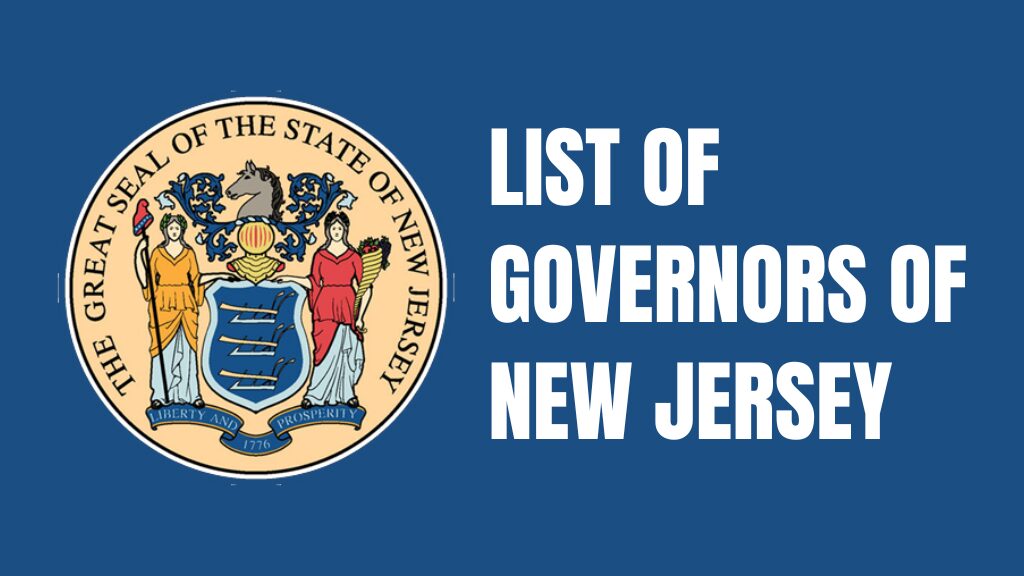New Jersey, a state with a rich political history, has seen a wide range of leaders at its helm. From its early days under British colonial rule to its current status as a densely populated and economically significant state, the role of the governor has been pivotal in shaping New Jersey’s destiny. This article explores the list of governors of New Jersey.
List of Governors of New Jersey
Below is a simplified list of the Governors of New Jersey, focusing primarily on those who served in the role following the establishment of the position in its current form, post the United States Declaration of Independence in 1776.
- William Livingston
- William Paterson
- Richard Howell
- Joseph Bloomfield
- Aaron Ogden
- William S. Pennington
- Mahlon Dickerson
- Isaac H. Williamson
- Peter D. Vroom
- Samuel L. Southard
- Elias P. Seeley
- Philemon Dickerson
- Daniel Haines
- Charles C. Stratton
- George F. Fort
- William A. Newell
- Charles S. Olden
- Joel Parker
- Marcus L. Ward
- Joseph D. Bedle
- George B. McClellan
- George C. Ludlow
- Leon Abbett
- Robert S. Green
- George T. Werts
- John W. Griggs
- Foster M. Voorhees
- Franklin Murphy
- Edward C. Stokes
- John Franklin Fort
- Woodrow Wilson
- James F. Fielder
- Walter E. Edge
- Edward I. Edwards
- George S. Silzer
- Morgan F. Larson
- Harold G. Hoffman
- Charles Edison
- Alfred E. Driscoll
- Robert B. Meyner
- Richard J. Hughes
- William T. Cahill
- Brendan Byrne
- Thomas Kean
- James Florio
- Christine Todd Whitman
- Donald DiFrancesco
- John O. Bennett (acting)
- Richard Codey (acting, then official)
- Jon Corzine
- Chris Christie
- Phil Murphy
The list provided above represents a chronological order of individuals who have served as the Governor of New Jersey. Each name on the list has played a pivotal role in shaping New Jersey’s policy, governance, and development throughout different periods in the state’s history.
William Livingston (1776-1790)
Livingston was New Jersey’s first governor post-independence, focusing on legal and governmental frameworks during the Revolutionary War. He advocated for education and the abolition of slavery.
William Paterson (1790-1793)
Paterson, a U.S. Constitution signer, served as governor and later as a U.S. Supreme Court Justice. He’s known for the New Jersey Plan, influencing the U.S. Senate’s structure.
Richard Howell (1793-1801)
Howell stabilized New Jersey’s finances and supported federalist policies. His administration emphasized military support and state militia development.
Joseph Bloomfield (1801-1802, 1803-1812)
Bloomfield, serving non-consecutively, worked towards gradual abolition in New Jersey and supported Jeffersonian policies. He also had a notable military career.
Aaron Ogden (1812-1813)
Ogden’s brief term faced political challenges. He is later known for his involvement in Gibbons v. Ogden, affecting federal-state power dynamics and commerce regulation.
William S. Pennington (1813-1815)
Pennington’s administration was marked by efforts to recover from the War of 1812. He focused on state security and judicial reforms.
Mahlon Dickerson (1815-1817)
Dickerson is noted for his support of infrastructure development, particularly in transportation. His tenure also emphasized economic recovery post-war.
Isaac H. Williamson (1817-1829)
Williamson’s long tenure saw a focus on social reforms, including improvements in education and public welfare systems.
Peter D. Vroom (1829-1832, 1833-1836)
Vroom, serving non-consecutively, advocated for state rights and was involved in the early political debates that would eventually lead to the Civil War. He also worked on enhancing New Jersey’s infrastructure.
Samuel L. Southard (1832-1833)
Southard’s short term was significant for his efforts in improving public education and advocating for the development of New Jersey’s natural resources.
Elias P. Seeley (1833)
Seeley’s very brief governorship was focused on maintaining state policies and continuing the efforts of his predecessors without initiating major new reforms.
Philemon Dickerson (1836-1837)
Dickerson’s administration is remembered for its focus on civil rights and infrastructure, particularly in supporting the development of the Morris Canal.
Daniel Haines (1843-1845, 1848-1851)
Haines, serving two non-consecutive terms, was a strong advocate for prison reform and education. He is also noted for his efforts to amend New Jersey’s constitution to make it more democratic.
Charles C. Stratton (1845-1848)
Stratton’s tenure was marked by economic development and support for agriculture. He advocated for tariff reforms and improvements in public education.
George F. Fort (1851-1854)
As governor, Fort focused on public health and the establishment of state hospitals. He also supported reforms in mental health care.
William A. Newell (1857-1860)
Newell is best remembered for founding the United States Life-Saving Service, a precursor to the modern Coast Guard. His administration also focused on educational improvements.
Charles S. Olden (1860-1863)
Olden led New Jersey during the critical early years of the Civil War, focusing on state defence and support for the Union cause, while also managing state finances.
Joel Parker (1863-1866, 1872-1875)
Parker, serving two non-consecutive terms, was known for his opposition to some of Lincoln’s policies and advocated for state rights. His governance also focused on post-war recovery.
Marcus L. Ward (1866-1869)
Ward’s administration was notable for its support of veterans and efforts to integrate Civil War veterans back into society. He also focused on educational reforms.
Joseph D. Bedle (1875-1878)
Bedle’s term was characterized by a conservative approach to governance, focusing on judicial reforms and maintaining fiscal conservatism.
George B. McClellan (1878-1881)
The former Civil War general turned governor focused on educational reforms and infrastructure improvements, including public works and transportation.
George C. Ludlow (1881-1884)
Ludlow’s administration is noted for labor reforms and efforts to improve working conditions, reflecting the growing industrial challenges of the era.
Leon Abbett (1884-1887, 1890-1893)
Abbett, known for his populist approach, focused on labour rights, corporate regulation, and advocating for the rights of workers against monopolies. His terms saw significant legal reforms in favour of labour.
Robert S. Green (1887-1889)
Green’s administration focused on civil service reform and improving public welfare systems. He sought to reduce political corruption by promoting merit-based appointments.
George T. Werts (1893-1896)
Werts is known for his efforts in judiciary reform, particularly in modernizing the court system and advocating for the establishment of a state court of errors and appeals.
John W. Griggs (1896-1898)
Griggs’ tenure was marked by his focus on education reform and public health. He later served as the U.S. Attorney General, bringing his reformist zeal to the federal level.
Foster M. Voorhees (1898-1902)
Voorhees promoted economic development and conservation, including the preservation of New Jersey’s natural resources. He was also instrumental in establishing state parks and forest management programs.
Franklin Murphy (1902-1905)
Murphy’s administration is noted for its focus on educational improvements and infrastructure development. He supported the expansion of public schools and improvements in transportation.
Edward C. Stokes (1905-1908)
Stokes emphasized business regulation and environmental conservation. His tenure saw the passage of laws aimed at regulating monopolies and protecting natural resources.
John Franklin Fort (1908-1911)
Fort focused on social welfare and public health, including the enactment of food and drug safety standards. He was known for his progressive stance on social issues, advocating for reforms that protected consumers and improved public welfare.
Woodrow Wilson (1911-1913)
Before becoming the 28th President of the United States, Wilson was noted for his progressive reforms in New Jersey, including the establishment of a workers’ compensation system, regulation of utilities, and reform of the state’s education system.
James F. Fielder (1913-1917)
Fielder continued the progressive policies of his predecessor, focusing on tax reforms and furthering labor rights. His tenure saw efforts to balance the interests of labor and business.
Walter E. Edge (1917-1919, 1944-1947)
Edge served two non-consecutive terms and is known for his fiscal conservatism, efforts to improve the state’s highway system, and support for education.
Edward I. Edwards (1920-1923)
Edwards’ governorship is most remembered for his opposition to Prohibition, advocating for the rights of states in determining alcohol laws. He also focused on tax reductions and prison reform.
George S. Silzer (1923-1926)
Silzer’s tenure was characterized by a focus on educational funding and public welfare programs. He supported infrastructure development, particularly in transportation.
Morgan F. Larson (1928-1932)
During Larson’s administration, New Jersey faced the challenges of the Great Depression. He focused on economic relief efforts and infrastructure projects to create jobs.
Harold G. Hoffman (1935-1938)
Hoffman’s term saw further efforts to combat the economic difficulties of the Depression, including support for New Deal programs in the state and improvements in unemployment insurance.
Charles Edison (1941-1944)
The son of Thomas Edison, Charles focused on state defense efforts during World War II, as well as on education and health services. He advocated for innovation in governance and public services.
Alfred E. Driscoll (1947-1954)
Driscoll’s governance was marked by significant constitutional reform, leading to the 1947 New Jersey State Constitution which restructured the state government. He also focused on highway development and urban renewal.
Robert B. Meyner (1954-1962)
Meyner’s administration focused on civil rights and the expansion of the state government’s role in education, health care, and welfare.
Richard J. Hughes (1962-1970)
Hughes dealt with urban unrest and the civil rights movement. He advocated for the creation of the New Jersey Transit system and worked on judicial reform, including the establishment of the state’s public defender system.
William T. Cahill (1970-1974)
Cahill’s tenure saw environmental initiatives, including the creation of the Department of Environmental Protection. He also focused on educational reforms and the improvement of public transportation.
Brendan Byrne (1974-1982)
Byrne is most noted for his role in the development of the Meadowlands Sports Complex and the legalization of casino gambling in Atlantic City. He also implemented the state’s first income tax to fund public education and urban development.
Thomas Kean (1982-1990)
Kean’s governorship was marked by his focus on education, including the establishment of the “Quality Education Act” to address funding disparities. He was known for his environmental conservation efforts and for promoting New Jersey as a hub for high-tech industries.
James Florio (1990-1994)
Florio’s term is remembered for his controversial tax increase to address the state budget deficit and for legislation on gun control. He also focused on health care and environmental legislation.
Christine Todd Whitman (1994-2001)
Whitman was the first woman to serve as New Jersey’s governor. Her administration focused on tax cuts, environmental protection, and education reform. She also initiated welfare reform measures to promote work and self-sufficiency.
Donald DiFrancesco (2001-2002)
DiFrancesco’s short tenure (he served as acting governor) focused on continuing the policies of his predecessor and managing the state’s response to the September 11 attacks, as part of the regional effort given New Jersey’s proximity to New York City.
John O. Bennett (acting, 2002)
Bennett’s very brief tenure as acting governor (a few days) was a result of the unique circumstances of New Jersey’s gubernatorial transition. His time in office was too short for significant policy impacts but underscored the state’s unique political landscape.
Richard Codey (acting, 2004-2006; then official)
Codey served first as acting governor and then officially, focusing on mental health reform, ethics reform in government, and public safety. He was praised for his handling of state affairs during his tenure, bringing stability and a focus on health and welfare issues.
Jon Corzine (2006-2010)
Corzine’s administration focused on fiscal reforms, including efforts to balance the state budget and improve the state’s financial health. He also worked on public health initiatives and signed legislation to abolish the death penalty in New Jersey, making it the first state to legislatively abolish capital punishment since the Supreme Court reinstated the death penalty in 1976.
Chris Christie (2010-2018)
Christie’s two terms weremarked by his handling of the aftermath of Hurricane Sandy, pension reform, and efforts to combat the opioid epidemic. His tenure was also notable for controversies, including the “Bridgegate” scandal. Christie was a prominent figure on the national stage, especially during his 2016 presidential campaign.
Phil Murphy (2018-present at the knowledge cutoff in 2023)
Murphy has focused on progressive policies, including minimum wage increases, environmental initiatives, and the legalization of recreational marijuana. His administration has also worked on healthcare expansion, education funding, and addressing the COVID-19 pandemic’s challenges through public health measures and economic support programs.
Conclusion
The governors of New Jersey have played indispensable roles in the state’s development, facing challenges and making decisions that have shaped its course over centuries. Their legacies, marked by both triumphs and trials, continue to influence New Jersey’s political, economic, and social landscape. Copy Smarter. Paste Faster. Learn Quickly. Explore expert guides, quick tips, and smart solutions start saving time today!
FAQs
Who was the first governor of New Jersey?
Philip Carteret served as the first governor during the colonial era, while William Livingston was the first elected governor after independence.
Which New Jersey governor served the longest term?
Brendan Byrne and Tom Kean both served two full terms, making them among the longest-serving governors in recent history.
How does New Jersey’s governor influence national politics?
New Jersey governors often engage in national discussions, leveraging the state’s economic significance and strategic location to influence federal policy and political debates.
Related Post:




